By BETSY TAYLOR
At the South Mobile County Care Center, staff are accustomed to the arrival of Peang Ly Ang, a Cambodian immigrant who has lived in the United States for more than four decades. She drives other community members to the center when they need health care assistance or social services. She often steps in as a translator, bridging the communication between a clinician or social worker and the patient.
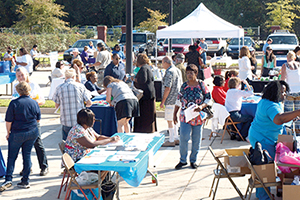
BayouClinic, Ascension's Providence Hospital and the Feeding the Gulf Coast food pantry are among the sponsoring organizations at this Bayou on the Move event on Oct. 30. Exhibitors promote programs that help improve the physical, financial and mental well-being of residents in South Mobile County communities.
Ang helps dozens of Cambodian families, in part, because she recalls the people who assisted her and her husband after they first arrived in the U.S. in 1975. They were fleeing Cambodia as the genocidal Khmer Rouge regime came to power there. She feels a responsibility to assist others. "When they ask me, I can't say no. If I said no, I couldn't sleep good," Ang said.
Located a stone's throw from shrimping boats anchored on an Alabama bayou, the South Mobile County Care Center, where Ang shuttles area residents, is a gray modular building that houses a modest office. It is an outreach ministry of Ascension's Providence Hospital, located about 30 miles away in Mobile, Ala. It is staffed, depending on the day of the week, by a social worker, a nurse educator or employees from government and social service programs in the region.
This unassuming outpost, which opened last year, is part of an effort in the region to meet immediate health care needs of residents while working for systematic change. Before the office opened, Providence Hospital provided care in the region from a donated medical van. Residents were hard hit by Hurricane Katrina in 2005, and a three-year commitment to assist in the region developed into the ongoing Providence Hospital program to help those in need.
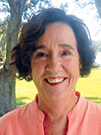
Weems
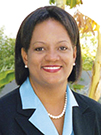
Benjamin
In an area where many low-income residents don't have cars, and many rely on government-subsidized phones and limited calling minutes, the center serves as a lifeline, providing access to services many would be hard-pressed to get otherwise. They stop by the care center for gas cards to get to a doctor's appointment, to enroll in a health education class or to sign up for a service that delivers their medication to their homes.
South Mobile County includes several Gulf Coast communities that are both scenic and economically struggling. The U.S. Census Bureau said in 2014 that about a third of the residents of the city of Bayou La Batre, where the center is located, live below the poverty level. The median household income is around $33,000 in this community of about 2,600. About a third lack health insurance. (Alabama has not expanded Medicaid eligibility under the Affordable Care Act.) The majority of Bayou La Batre's residents are white. About a quarter of the residents are Southeast Asian, 12 percent are black and 3 percent are Hispanic, said Kim Weems, a social worker who is Providence Hospital's outreach and advocacy manager.
No quick fix
"We learn constantly about new needs. We help people individually, and we're glad we can, but how do you help the whole community?" said Weems.
Work to build and strengthen partnerships between organizations has been key to addressing this question in South Mobile County. Providence Hospital is working closely with Feeding America, a nonprofit network of food banks that includes an area food bank called Feeding the Gulf Coast; and BayouClinic, which is the health care clinic founded by Dr. Regina Benjamin in 1990. Benjamin, a family medicine doctor, served as the 18th U.S. Surgeon General and has returned to the clinic as its chief executive. A nurse practitioner and two part-time physicians are among those who staff the clinic, which is a federally qualified health center look-alike, Benjamin said. The clinic is not part of Ascension; Benjamin is a member of Ascension's board of directors. She also is a past board member for CHA.
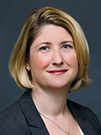
Battles
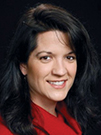
Prendergast
Benjamin said, "I think it's important that the community comes together, and that we step outside of the hospital and outside of the clinic to be a part of the community itself. Not just asking them to come to our facilities, (but) that we be a part of what they want, and what they need."
Caroline Battles, Ascension's vice president for state advocacy and community health, said, "We've had a focus and have been strongly encouraging folks for a long time to look at the social and economic factors, to really think about the social determinants and the environment in which people live." She said Ascension hospitals, like Providence Hospital, are helping communities as a whole by addressing the social determinants of health — the conditions in the places where people live, learn, work and play that can affect residents' health.
Widespread food insecurity
In South Mobile County, Providence Hospital's care center, Feeding the Gulf Coast and BayouClinic have been working to better address food insecurity and to improve diabetes education.
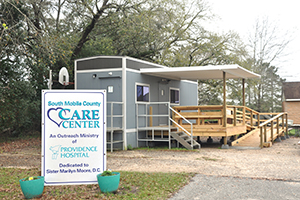
Ascension's Providence Hospital runs the South Mobile County Care Center in Bayou La Batre, Ala., as an outreach site. Area residents visit for assistance with health care and social services needs.
Bayou on the Move, an ongoing initiative over several years to improve health and encourage physical activity, included a greater focus on food insecurity at a community event last year. About three dozen organizations provided health and community resources related to physical, financial, community and mental health to the 300 people in attendance at the event at BayouClinic.
Fifty-nine participants completed a five-question survey asking questions like whether in the last year, the person bought "food that didn't last" and then didn't have money to get more. Respondents were asked if they ever reduced the size of their meals or skipped meals because there wasn't enough money for food.
Bayou on the Move organizers said almost all of those surveyed experienced food insecurity, with the majority of those reporting what's known as "very low food security." That's when an individual or household reduces food intake and skips meals because of a lack of resources.
Bayou on the Move gave away about 200 boxes of nutritious food at the event. Participants got eye exams and vouchers for free glasses; they got blood pressure readings and follow-up when warranted; and they got the word out about healthy eating and diabetes education classes at the South Mobile County Care Center and BayouClinic. Those locations offer the classes to Cambodian, Laotian and Vietnamese communities, using translators.
Weems said years ago, there was a misconception that immigrants in the area weren't always complying with recommended prevention and treatment options because of "a distrust of Western medicine," but care center staff working with these populations learned instead "that no one was educating them in their languages," she said.
Beyond the bayou
The organizations believe their community ties in Alabama could foster policy and programmatic change on a broader scale. Ascension and Feeding America have done some advocacy briefings for government officials related to food insecurity and its impact on health in the U.S.
Kim Prendergast, a community health and diabetes consultant for Feeding America, said in March about 140 people from around the country also took part in a webinar about how to build collaborations between food banks and hospitals. She said, in some cases, such programs serve as a "match making service," bringing together representatives of Ascension hospitals and Feeding America food pantries to think about new collaborations related to health and access to healthy, nutritious foods.
Benjamin spoke with Catholic Health World about her work to encourage healthy communities.
Benjamin on why health care systems need to work throughout communities to improve health
Benjamin stresses the importance of listening to what residents say they need when working on improving health
Copyright © 2016 by the Catholic Health Association of the United States
For reprint permission, contact Betty Crosby or call (314) 253-3477.